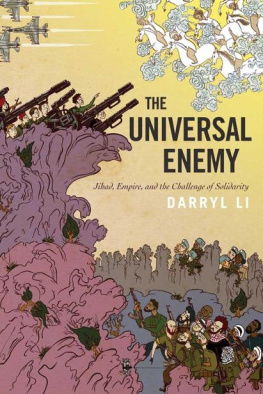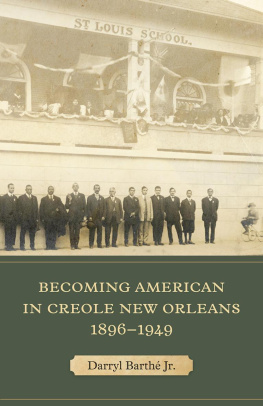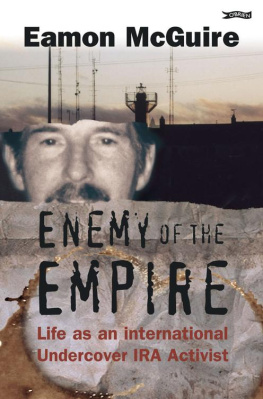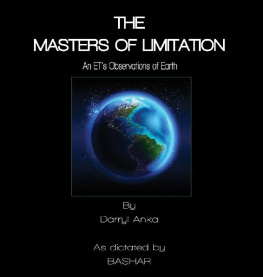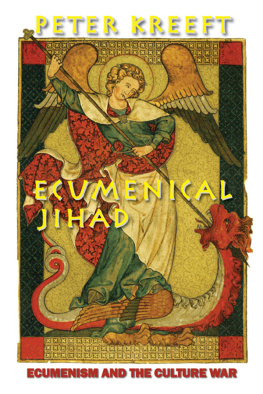Darryl Li - The Universal Enemy: Jihad, Empire, and the Challenge of Solidarity
Here you can read online Darryl Li - The Universal Enemy: Jihad, Empire, and the Challenge of Solidarity full text of the book (entire story) in english for free. Download pdf and epub, get meaning, cover and reviews about this ebook. year: 2019, publisher: Stanford University Press, genre: Politics. Description of the work, (preface) as well as reviews are available. Best literature library LitArk.com created for fans of good reading and offers a wide selection of genres:
Romance novel
Science fiction
Adventure
Detective
Science
History
Home and family
Prose
Art
Politics
Computer
Non-fiction
Religion
Business
Children
Humor
Choose a favorite category and find really read worthwhile books. Enjoy immersion in the world of imagination, feel the emotions of the characters or learn something new for yourself, make an fascinating discovery.
The Universal Enemy: Jihad, Empire, and the Challenge of Solidarity: summary, description and annotation
We offer to read an annotation, description, summary or preface (depends on what the author of the book "The Universal Enemy: Jihad, Empire, and the Challenge of Solidarity" wrote himself). If you haven't found the necessary information about the book — write in the comments, we will try to find it.
Darryl Li: author's other books
Who wrote The Universal Enemy: Jihad, Empire, and the Challenge of Solidarity? Find out the surname, the name of the author of the book and a list of all author's works by series.
The Universal Enemy: Jihad, Empire, and the Challenge of Solidarity — read online for free the complete book (whole text) full work
Below is the text of the book, divided by pages. System saving the place of the last page read, allows you to conveniently read the book "The Universal Enemy: Jihad, Empire, and the Challenge of Solidarity" online for free, without having to search again every time where you left off. Put a bookmark, and you can go to the page where you finished reading at any time.
Font size:
Interval:
Bookmark:
THE UNIVERSAL ENEMY
Jihad, Empire, and the Challenge of Solidarity
Darryl Li
STANFORD UNIVERSITY PRESS
Stanford, California
STANFORD UNIVERSITY PRESS
Stanford, California
2020 by the Board of Trustees of the Leland Stanford Junior University.
All rights reserved.
No part of this book may be reproduced or transmitted in any form or by any means, electronic or mechanical, including photocopying and recording, or in any information storage or retrieval system without the prior written permission of Stanford University Press.
Printed in the United States of America on acid-free, archival-quality paper
Library of Congress Cataloging-in-Publication Data
Names: Li, Darryl, author.
Title: The universal enemy : jihad, empire, and the challenge of solidarity / Darryl Li.
Other titles: Stanford studies in Middle Eastern and Islamic societies and cultures.
Description: Stanford, California : Stanford University Press, 2019. | Series: Stanford studies in Middle Eastern and Islamic societies and cultures | Includes bibliographical references and index.
Identifiers: LCCN 2019012268 | ISBN 9780804792370 (cloth ; alk. paper) | ISBN 9781503610873 (pbk. ; alk. paper) | ISBN 9781503610880 (epub)
Subjects: LCSH: JihadPolitical aspectsBosnia and Herzegovina. | Panislamism. | SolidarityReligious aspectsIslam. | Muslim soldiersBosnia and Herzegovina. | Yugoslav War, 19911995Participation, Muslim. | Yugoslav War, 19911995Participation, Foreign. | Yugoslav War, 19911995Bosnia and Herzegovina.
Classification: LCC BP65.B54 L5 2019 | DDC 320.55/7dc23
LC record available at https://lccn.loc.gov/2019012268
Cover design: Kevin Barrett Kane
Cover art: Omar Khouri
Typeset by Kevin Barrett Kane in 10.5/14.4 Brill
Stanford Studies in Middle Eastern and Islamic Societies and Cultures
Contents
Terms of Engagement
All translations from Arabic, Bosnian/Croatian/Serbian, French, Italian, and Urdu/Hindi are my own unless otherwise specified.
Arabic or Urdu names are transliterated according to a modified version of the system used by the Library of Congress, unless the individual has settled on a spelling of their own. Diacritics are generally limited to quotations, translation glosses, bibliographic references, and the list of terms below. Pluralization of such words will usually follow English conventions rather than those of the original languages unless otherwise specified (for example, mujahids rather than mujahidun/mujahidin).
I have done my best to use non-English language terms only to the extent necessary. When such words appear for the first time, they are italicized to draw the readers attention. All such italicized terms are also listed below for reference. Following is a list of organizations and other entities referred to in this book. Quite a few of them have names and acronyms in multiple languages or scripts. Here, they are alphabetized according to the names under which they will appear in the body of the book; those names are written in boldface. For languages written in Latin script, acronyms are given in the original language. In Arabic, acronyms are used less frequently, hence acronyms given are for the name translated into English.
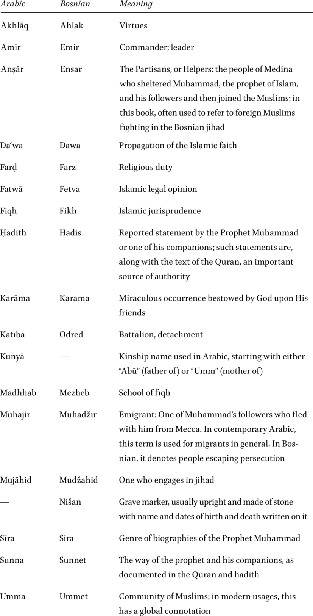
Ahl-i adth: South Asian Islamic revivalist movement that rejects deference to established schools of Islamic jurisprudence (madhhabs); strong doctrinal overlaps with Salafis in the Arab world and often conflated with them.
Revival of Islamic Heritage Society (Arabic: Jamiyyat Iy al-Turth al-Islm, Bosnian: Organizacija preporoda Islamske tradicije): Kuwaiti Salafi political and charitable organization.
HVO (Hrvatsko vijee obrane): Croat Defense Council; most powerful militia of Bosnian Croat nationalist forces.
Islamic Group (al-Jama al-Islmiyya): Social movement and armed opposition group that sought to establish an Islamic state in Egypt.
IZ (Islamska zajednica): Islamic Community; official body overseeing Islamic religious institutions in Bosnia.
The Katiba (Arabic: Katbat al-Mujhidn, Bosnian: Odred Elmudahedin): Mujahids battalion in the Bosnian army.
Muslim Forces (Muslimanske snage): Militias in the early stages of the Bosnian war that stressed proper observance of Islamic ritual and piety requirements, later folded into the 7th Muslim Brigade of the Bosnian army; not to be confused with the Bosnian army itself, whose ranks were predominantly composed of individuals identifying with the Muslim or Bosniak nationality but without necessarily committing to any particular practice orientation.
SDA (Stranka demokratske akcije): Largest Bosniak nationalist political party.
SHC (Arabic: al-Haya al-uliy li-jam al-tabarrut lil-Bsna wal-Harsak, Bosnian: Visoki Saudijski komitet za pomo Bosni i Hercegovini): Saudi High Committee for Bosnia, the largest foreign Islamic NGO to operate in Bosnia in the aftermath of the war.
TO (Teritorijalna odbrana): Territorial Defense militias in socialist Yugoslavia, some of which later formed part of the basis for the Bosnian army.
Dramatis Personae
Following is a list of people who appear in multiple chapters of this book. Some are public figures, but most are individuals I interviewed. Of the latter, some prefer to be named because they feel that publication of their narratives in this book serves their interests. But others cannot be identified here due to fear of arrest, deportation, or worse. In cases of doubt I have chosen to maintain anonymity. For the sake of clarity, the names that will be used most consistently in the book are in bold and the list is alphabetized accordingly. Pseudonyms assigned in this book for the purposes of disguising identities are in italics. Several people here, including public figures, are identified by their kunyas, which are widely used in jihad activism.
Mahmud Bahadhiq (Abu Abd al-Aziz): Leader of one of the earliest groups of Arabs to fight in Bosnia.
Abu Ali al-Maghribi: Moroccan mujahid disabled during a 1993 battle.
Imad al-Husin (Abu Hamza al-Suri): Syrian who studied in Yugoslavia prior to the war; worked as interpreter in the Katiba.
Abu al-Harith al-Libi: Libyan physician who came to the war from Vienna; first amir of the Katiba.
Abu al-Maali al-Jazairi: Algerian who came to the war from France; succeeded Abu al-Harith as amir of the Katiba.
Abu al-Zubayr al-Haili: Saudi, led a smaller group of mujahids independent of the Katiba.
Ayman Awad: Syrian, emigrated to Yugoslavia for study in early 1980s; joined the Katiba as an interpreter.
Abd Allah Azzam (19411989): Palestinian jurist and activist; most prominent Arab supporter of the Afghan jihad; founded and ran the Services Office to coordinate Arab and other foreign Muslim volunteers in the Afghan jihad.
Fadhil al-Hamdani: Iraqi, studied in Yugoslavia from 1979 onward; joined the Katiba as an interpreter.
Imad el-Misri: Proselytizer and mujahid, head for some time of the Katibas school, and author of the pamphlet Notions That Must Be Corrected.
Alija Izetbegovi (19252003): Bosnian Muslim nationalist leader; founder and president of the Party of Democratic Action (SDA), president of Bosnia-Herzegovina (19921996), Bosniak member of the presidency of Bosnia-Herzegovina (19962000).
Next pageFont size:
Interval:
Bookmark:
Similar books «The Universal Enemy: Jihad, Empire, and the Challenge of Solidarity»
Look at similar books to The Universal Enemy: Jihad, Empire, and the Challenge of Solidarity. We have selected literature similar in name and meaning in the hope of providing readers with more options to find new, interesting, not yet read works.
Discussion, reviews of the book The Universal Enemy: Jihad, Empire, and the Challenge of Solidarity and just readers' own opinions. Leave your comments, write what you think about the work, its meaning or the main characters. Specify what exactly you liked and what you didn't like, and why you think so.

